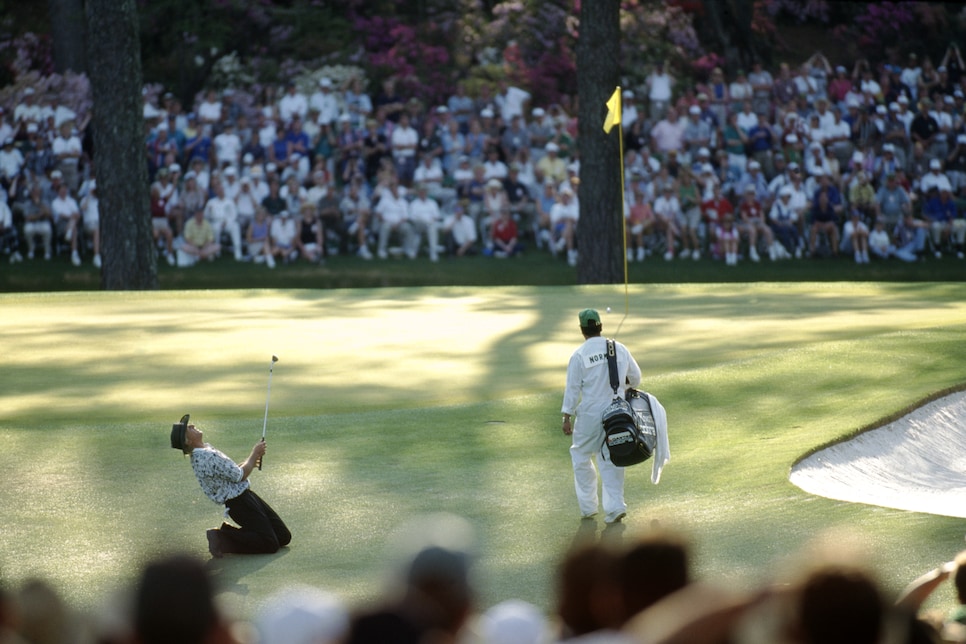“Losing” is a slippery concept in golf when considering how infrequently anyone actually wins. The standard stroke-play tournament on the PGA Tour features one winner and 155 also-rans. At the recreational level, success is mostly defined by screwing up less than usual. In other words, the game imparts enough misfortune where golfers should be equipped to handle losing better than other athletes. Yet even then, we probably don’t take enough time to consider all the ways losing actually makes us better.
The premise for my new book, Win at Losing: How Our Biggest Setbacks Can Lead To Our Greatest Gains, was to explore the the various ways we benefit from failure -- not just in golf or even just in sports, but in all aspects of life. In conversations with athletes and coaches, as well as executives, politicians and psychologists, my objective was to find ways to navigate losing so it ends up being a constructive rather than demoralizing experience.
So how is losing good for golfers? Here are five ways:

1. Losing forces us to address our weaknesses: As devastating as Jordan Spieth’s collapse in the 2016 Masters was, there is reason to believe the experience will serve him long term. Why? Because after Spieth went through a comparable experience losing the 2014 Masters and Players, he sought to analyze why, and went on to a breakthrough 2015 season that featured wins in the year’s first two majors. For players like Spieth, losing or disappointing golf often crystallizes the parts of their game that need attention, whether it’s a specific swing flaw or as he noted after his first loss at Augusta, a need for greater patience. “Jordan never dodges," Spieth’s instructor Cameron McCormick told Golf Digest’s Jaime Diaz. "He's amazingly reflective, both during a round and after a round.”

Nick Laham
2. Losing restores motivation: Staying with Spieth for a moment, his loss at last year’s Masters, in which he blew a five-shot lead on the back nine, actually came at an opportune moment in his career. Remember this was a golfer who won two majors and the FedEx Cup the year before. To win another Masters at such a young age could have led to complacency, as if he had already scaled the mountain top. “In many ways I’m not sure that it isn’t a good thing for [Spieth],” Jack Nicklaus said at a press conference shortly after the Masters. “What I mean by that is that he’s 22 years old. To win a Masters twice at 22 years old, that puts him right at the top of everything. Winning it twice might take away some of that focus.” Phil Mickelson invoked a similar sentiment when discussing his continued pursuit of a first U.S. Open. “I’ve always been somebody, ever since I was a kid, that got motivated by failure, that worked harder because of failure,” Mickelson said at the 2015 U.S. Open. “Some people get discouraged by that, and it almost pushes them away. But for me it’s been a motivator to continue to work harder and get over that hump.”

Stephen Szurlej
3. Losing teaches humility: No sport can put you in your place better than golf, but there are fleeting moments when we feel as though we’ve got it all figured out. The lesson there? Don’t believe it. Among the reasons why Greg Norman struggled as much as he did in big tournaments is he had achieved such heights in regular weeks on tour, he often ignored the prudent play when the stakes were highest. Casual players need their own reminders as well. Whether it’s deciding whether to lay up or to go after a sucker pin, a little bit of fear isn’t a bad thing, and that comes from finding out the hard way.

Getty Images
4. Losing helps you redefine success: Consider Tiger Woods for a moment. For the majority of his career, he would state that his only goal was to win, and anything short of that would be a disappointment. Fast forward to earlier this month, when Woods returned to golf after a 15-month absence. He hadn’t won a tournament in three years, and there remained questions about whether he could even play golf at a semi-respectable level again. No longer could Woods cite winning as the only palatable outcome. He said playing four rounds was important, and that his focus was just getting stronger over the next few months. If anything, he was stressing the type of “process goals” that psychologists cite as vital for achievement. For amateur players, a process goal can be as simple as trying to keep your head down on every putt, or holding your finish out of a bunker. The more you reward yourself for executing the small things, the less daunting the big stuff will seem.

Harry How/Getty Images
5. Losing fosters resilience: One of the greatest benefits of losing is it provides you the opportunity to bounce back from it. That was the dynamic Adam Scott experienced when he bogeyed the last four holes in the 2012 Open Championship to lose, then rallied to win the Masters the following April. “You have to put yourself in that position,” he says, “because it’s the only way you’ll ever win.” If anything, Butch Harmon says, a loss early in a career can be better than a win in that it provides you the skills to deal with disappointments. “Sometimes guys get out here and they do so well and then you wonder what happened,” Harmon says. “Well sometimes it came too easy, and all of a sudden when it’s not so easy they don’t know how to deal with it.” Even for those golfers who never contend in a tournament, there’s value in the experience of coming away from whatever round unhappy, if only to have a better sense of how to navigate the aftermath. Golf is a game of perpetual frustration. Your ability to deal with disappointment can always get easier, even if the game never does.
